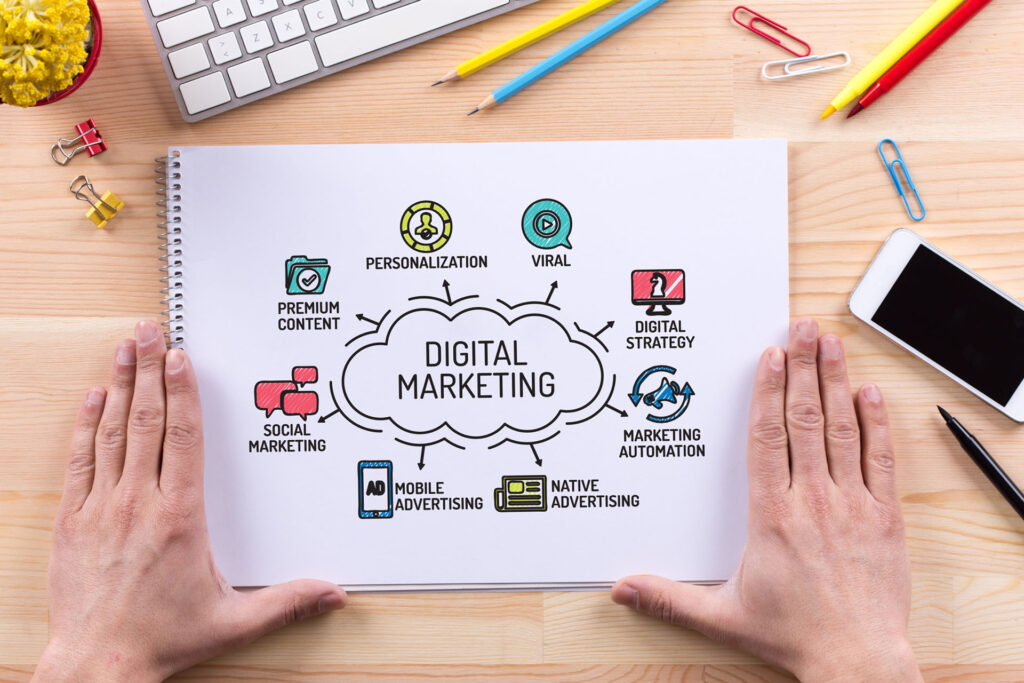In digital marketing, maintaining a competitive edge is no longer a luxury but a vital necessity. As technology continues to reshape the digital landscape, the role of marketers and business owners in navigating these changes becomes increasingly pivotal. The digital era demands a proactive approach, urging professionals to stay ahead of the curve by embracing and integrating emerging trends. Beyond merely following the latest fads, strategic adaptation to the evolving dynamics of consumer behavior, technology advancements, and market shifts is imperative. This proactive stance is not only about survival; it’s a strategic imperative for businesses aiming not just to thrive but to lead in their respective industries.
As we delve into the intricacies of digital marketing and current trends, understanding and leveraging the transformative power of technology is a prerequisite for effective audience connection. We will unravel some of the intriguing and impactful digital marketing trends that are currently shaping the industry landscape. By dissecting these trends and exploring their potential implications, we aim to equip marketers and business owners with the insights needed to make informed decisions and craft strategies that resonate with the ever-evolving expectations of their audiences.
1. AI and Machine Learning Integration
Artificial Intelligence (AI) and Machine Learning (ML) are not just buzzwords; they are revolutionizing the way digital marketing operates. AI can analyze vast amounts of data to identify patterns and trends, enabling marketers to make data-driven decisions. Machine Learning algorithms can personalize user experiences by predicting consumer behavior based on their past interactions. Chatbots powered by AI are becoming more sophisticated, providing instant customer support and engagement. Incorporating AI and ML into your digital marketing strategy will not only streamline processes but also enhance the overall customer experience.
2. Video Marketing Dominance
Video content has been on the rise for a while, and its dominance is expected to continue. According to recent studies, consumers are more likely to engage with video content compared to other forms. Short-form videos on platforms like TikTok and Instagram Reels are gaining popularity, providing marketers with a new avenue to connect with younger demographics. Live streaming is another aspect of video marketing that offers real-time interaction with audiences, fostering a sense of immediacy and authenticity. Integrating compelling video content into your digital marketing strategy will be crucial for capturing and retaining audience attention. As video content continues to dominate the digital landscape, its versatility, from short-form videos on platforms like TikTok and Instagram Reels to the immediacy and authenticity of live streaming, underscores the imperative for businesses to integrate compelling video content into their digital marketing strategies, ensuring a captivated and engaged audience.
3. Influencer Marketing Evolution
Influencer collaboration has evolved into a cornerstone of strategic initiatives, surpassing the traditional realm of celebrity endorsements. This evolution is marked by the rising prominence of micro and nano-influencers, whose smaller yet fervently engaged audiences offer a more niche and authentic connection. The emphasis has shifted towards authenticity and relatability, with consumers valuing genuine connections over celebrity status. In tandem, the trend towards fostering long-term partnerships with influencers is gaining traction, as it has proven to be more effective in establishing a consistent brand narrative and, subsequently, building trust and credibility among the audience. As the influencer marketing landscape continues to transform, staying attuned to these nuanced shifts becomes imperative. By understanding and adapting to these evolving dynamics, businesses can leverage influencer marketing as a powerful tool for building authentic relationships and enhancing their overall digital strategy.
4. Voice Search Optimization
With the increasing prevalence of voice-activated devices like smart speakers and virtual assistants, voice search is changing the way users interact with the internet. Optimizing content for voice search is crucial for staying relevant in this landscape. People tend to use more conversational queries in voice search, so tailoring your content to match these patterns is essential. Marketers should focus on natural language and long-tail keywords to align with the way users speak rather than type. Voice search optimization will not only improve your search engine rankings but also enhance user experience.
5. Augmented Reality (AR) in Marketing
Augmented Reality is breaking new ground in marketing by providing immersive experiences for consumers. AR applications, such as virtual try-ons or interactive product demonstrations, allow users to engage with products before making a purchase. Brands can leverage AR to create unique and memorable experiences that differentiate them from competitors. As AR technology becomes more accessible, integrating it into your digital marketing strategy can set your brand apart and create a lasting impression on consumers.

6. Personalization Through Data Insights
Consumers now expect personalized experiences tailored to their preferences and behaviors. Utilizing data insights and analytics to understand customer behavior is crucial for delivering personalized content and offers. Personalization goes beyond just addressing customers by their first name; it involves understanding their purchase history, preferences, and browsing habits. Implementing dynamic content that adapts to individual user profiles can significantly enhance engagement and conversion rates. Investing in data-driven personalization tools will be essential for staying competitive in the evolving digital landscape.
7. Privacy-Centric Marketing Practices
As concerns about data privacy continue to grow, marketers need to adopt privacy-centric practices to build and maintain trust with their audiences. Cookie-less tracking, permission-based marketing, and transparent data practices are becoming industry standards. Marketers must ensure compliance with regulations such as GDPR and stay informed about emerging privacy frameworks. Emphasizing transparency in how customer data is collected and used will not only help in compliance but also foster trust and credibility among consumers. Fostering a culture of continuous education within marketing teams, ensuring they remain abreast of the ever-evolving privacy landscape, will empower professionals to navigate emerging regulations effectively and further fortify the trust between businesses and their increasingly privacy-conscious audiences.
8. Cross-Channel Integration for Seamless Experiences
In the digital age, consumers interact with brands across multiple channels, from social media and websites to emails and mobile apps. To stay ahead of the game, marketers need to focus on cross-channel integration to provide seamless and cohesive experiences. This involves ensuring that messaging and branding are consistent across all platforms, allowing customers to transition effortlessly between channels. By integrating data from various touchpoints, marketers can gain a holistic view of customer interactions and preferences, enabling them to deliver more personalized and relevant content. As the digital landscape becomes increasingly interconnected, mastering cross-channel integration will be pivotal in creating a unified and immersive brand experience that resonates with the modern consumer.
9. Social Commerce Integration
As social media platforms continue to evolve, so does their role in the consumer journey. Social commerce, the integration of shopping features directly into social media platforms, is gaining momentum. From Instagram’s shoppable posts to Facebook Marketplace, consumers now have the ability to discover, research, and purchase products without leaving their favorite social apps. Marketers need to strategically leverage these features, creating seamless shopping experiences and utilizing social proof to drive conversions. The convergence of social media and e-commerce presents a significant opportunity for brands to capitalize on impulse purchases and enhance customer engagement.
10. Sustainable and Ethical Branding
With environmental and social consciousness on the rise, consumers are increasingly gravitating towards brands that prioritize sustainability and ethical practices. This trend goes beyond just a marketing strategy; it’s becoming a fundamental aspect of brand identity. Companies that align themselves with eco-friendly initiatives, fair trade practices, and transparent supply chains are likely to resonate more with conscientious consumers. Incorporating sustainability into your marketing messaging, product packaging, and overall brand narrative can enhance your brand image and foster a sense of purpose that resonates with today’s socially aware audiences.

Implement These Digital Marketing Trends Today
The future of digital marketing is dynamic and full of opportunities for those who are willing to embrace change. By integrating AI and machine learning, leveraging the power of video marketing, adapting influencer strategies, optimizing for voice search, exploring augmented reality, personalizing experiences through data insights, and adopting privacy-centric practices, businesses can stay ahead of the game. The key lies in being proactive, staying informed, and continually evolving strategies to meet the ever-changing demands of the digital landscape. Those who can navigate these trends effectively will not only survive but thrive in the future of digital marketing.
Amidst the dynamic landscape of digital marketing, embracing change is the key to staying ahead. Integrating technologies like AI and machine learning, leveraging the impact of video marketing, adapting influencer strategies, optimizing for voice search, exploring augmented Reality, personalizing experiences through data insights, and adopting privacy-centric practices are crucial components of a forward-thinking strategy. Businesses must be proactive, stay informed, and continually evolve their approaches to meet the diverse and changing demands of the digital landscape, to thrive in this ever-evolving environment. Those who navigate these trends effectively will not only survive but thrive, creating a resilient and innovative presence in the future of digital marketing.
Check out our BrandRep blog today to learn more about digital marketing, SEO, and social media for your business.













